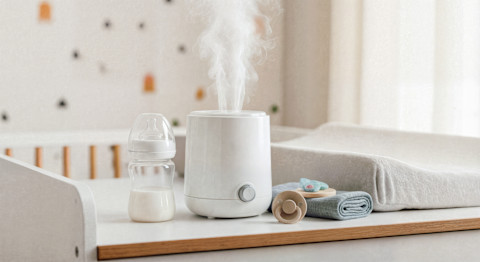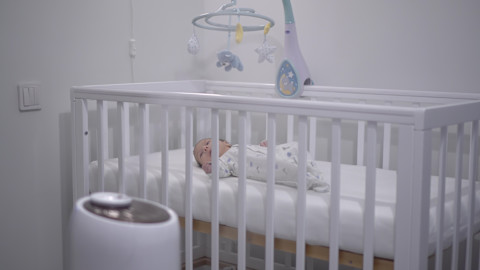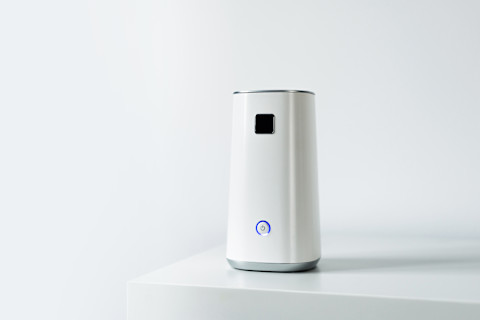Does My Newborn Need a Humidifier?
Updated on

Humidifier Guide for Newborns
All newborn parents need to make sure the air is not too dry, while also not too humid. This guide goes through the best humidifier and air purifier options for your nursery, that are also quiet and safe enough for your child.
In this article, we will cover the following topics:
- When Do Babies Need Dehumidifiers?
- Best Humidifers for Newborns
- Best Air Purifying Humidifiers for Newborns
- Is A Humidifier Safe Around a Newborn?
- Humidifiers vs Air Purifiers for Babies
- Find Local Humidity Advice on HomeStars
- FAQs Common Questions
When Do Babies Need Dehumidifiers?
Whether or not a newborn needs a humidifier often depends on your home environment. If you live in a naturally dry climate, or notice that your indoor air feels extra dry during the winter, using a humidifier can really help.
Dry air can cause babies to experience itchy skin, stuffy noses, or congestion, and a humidifier adds back just the right amount of moisture to make them more comfortable.
When’s the best time to use a humidifier for my baby?:
Using a humidifier in your newborn’s room is particularly helpful during winter months when indoor heating lowers humidity.
Humidifiers can relieve congestion in winter and make breathing easier, especially when babies have colds or are affected by dry indoor air.
Humidifiers can also be useful in hot summer months if the air is super dry.
HomeStars Tip: Aim to keep your home’s humidity in the 40 - 60% range. Not only does this help your baby breathe easier, but it can also reduce the spread of flu viruses.
Best Humidifiers for Newborns

Selecting the best humidifier for your newborn's room is crucial for ensuring a comfortable and safe environment. It's important to find a model that not only fits the room size but has the right features for your baby.
Here are some top features to consider:
Automatic shut-off: Look for a humidifier with an automatic shut-off feature to prevent over-humidification, which can lead to excess moisture.
Ease of cleaning: Choose a humidifier with a design that allows for hassle-free cleaning. Regular maintenance is essential to prevent bacteria and mold buildup & restoration costs.
Quiet operation: Ensure the unit operates quietly so it doesn't disturb your baby's sleep. This is especially important for nighttime use.
Adjustable humidity levels: Opt for a model that lets you adjust the humidity settings, ensuring you can maintain optimal moisture levels for your baby's comfort.
Cool mist feature: Cool mist humidifiers are generally safer for baby's rooms as they do not use heat, reducing any risk associated with hot steam.
If you want to talk to local professionals in your area who know all about keeping the humidity levels right in your home, you can post your job on HomeStars today.
Is A Humidifier Safe Around a Newborn?

Humidifiers can definitely be safe in a nursery environment. But there are some simple steps to make sure of this.
Follow these safety tips to safeguard your infant's environment:
Position devices securely: Ensure the machine is stable and placed on a flat surface, away from the crib, to prevent accidental spills or knocks.
Monitor humidity levels: Use a hygrometer to keep the room's humidity between 40-60% to prevent mold and mildew growth associated with overly damp conditions.
Regular maintenance: Clean both devices according to the manufacturer's instructions, ideally each week. This prevents bacteria, mold, and allergens from being dispersed into the air.
Use distilled water: For humidifiers, opt for distilled or demineralized water to avoid white dust and mineral deposits, which can be inhaled by your baby.
Check device filters: Air purifiers should have their filters checked monthly and replaced as recommended. This ensures maximum efficiency in trapping pollutants and maintaining air quality.
Avoid essential oils: These should not be added to humidifiers, as their strengths and potential effects on infants are uncertain and may pose health risks.
HomeStars Tip: Prioritize purchasing devices with built-in safety features like automatic shut-off and indicators for filter changes to enhance convenience and safety.
Humidifiers vs Air Purifiers for Babies
When you are making the decision between a humidifier or an air purifier for your newborn, it’s important to understand that each serves a different purpose.
A humidifier adds moisture to the air, helping to prevent dryness that can irritate a baby’s delicate skin and breathing passages. In contrast, an air purifier removes airborne particles like dust, pollen, and smoke, which is especially helpful if your baby has allergies or if you live in an area with poor air quality.
Here’s the different benefits of each option:
| Device | Benefit |
|---|---|
| Humidifier | Adding moisture to the air |
| Air Purifier | Removing air impurities |
| Humidifier & Air Purifier | Improving air quality and moisture levels |
Keep your baby’s unique needs in mind, such as skin sensitivity and the surrounding environment, when choosing between these devices. In some cases, using both together can provide the best balance for creating a healthier, more comfortable nursery. But this can depend on where you live in Canada.
You may want advice on heating & cooling in your local area, especially if you’ve just brought home your newborn and want to create the best environment possible for them. We have price guides on everything from heating & cooling in Vancouver, to heating and cooling in Edmonton.
Find Local Humidity Advice on HomeStars
If you are feeling worried about the humidity in your home, you can easily reliable HVAC contractor near you on MyBuilder. Whether you need them to test the humidity of your home or install a dehumidifier, it’s easy to post your job from home today, then get peace of mind that your air is getting sorted out.
FAQ: Common Questions Readers Ask About Humidifiers and Air Purifiers for Newborns
How does a humidifier help in maintaining the air quality for infants?
By adding moisture to the air, a humidifier can prevent the dryness that can irritate a newborn’s sensitive skin and respiratory system. It helps in keeping the nose and throat properly lubricated, reducing discomfort. Moreover, a humidifier can prevent the buildup of static electricity and help reduce dust movement, thereby contributing to a cleaner, more comfortable environment.
Is an air purifier necessary for a newborn's nursery?
An air purifier is not strictly necessary, but it can be a valuable addition to a newborn's nursery. It helps by removing pollutants, allergens, and other particles from the air, which could be beneficial if the nursery is located in an area with poor air quality or if the family has a history of allergies. For households with pets, smokers, or in urban areas, an air purifier can significantly reduce air contaminants.
How do I know if my newborn needs a humidifier in their room?
You may need a humidifier if your home has dry air, especially during winter months or if you run the heating often. Signs include your baby having dry skin, chapped lips, nasal congestion, or a persistent cough. A hygrometer can help you measure the humidity level to ensure it's within the ideal range.
How often should I clean a humidifier to ensure it is safe for my infant?
To ensure safety and hygiene, clean a humidifier every three days and perform a deep cleaning once a week. This includes emptying the water tank daily, wiping down surfaces that accumulate water, and descaling mineral deposits. Always follow the specific cleaning instructions provided by the manufacturer.
Related questions on Ask a pro
See what others are asking our expert pros. Browse all questions
Air conditioning
Humidifier + Thermostat
Norman Dewar 02/01/2026 - 4:39 PM
I want to replace my bypass humidifier and thermostat with something that performs better, and has an outdoor connect for automatic control. My house it 2000 square feet. Do you have any recommendations for the products to use?
2 answers
Air conditioning
AC Unit Out
Anonymous user 24/11/2025 - 8:49 AM
My AC unit has gone out in the middle of winter, should I fix now or later?
7 answers
Air conditioning
How to clean your AC machine
Emmanuel Red 04/11/2025 - 9:11 AM
How to clean your AC machine
1 answer
Need expert advice?
Ask a questionDiscuss your job with pros so they can accurately estimate the cost.